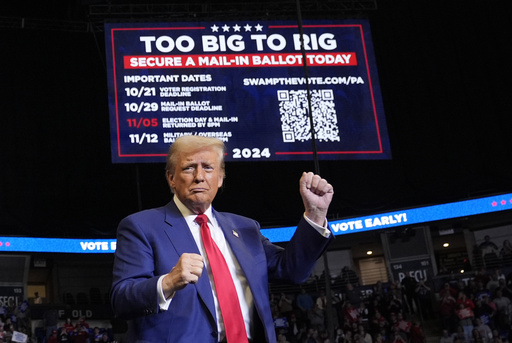
WASHINGTON — As the presidential election looms, American voters are expressing significant anxiety regarding the potential outcomes, particularly the likelihood of political violence, the possibility of efforts to reverse election results, and the overall implications for democracy, based on a recent poll.
The survey results highlight ongoing worries about the stability of the United States’ democratic process, especially in the wake of former President Donald Trump’s refusal to accept the 2020 election results, which incited a violent storming of the U.S. Capitol. Nearly four years later, these issues continue to resonate deeply among the electorate.
Approximately 40% of registered voters report being “extremely” or “very” concerned about the prospect of violent attempts to overturn the election results following the impending election in November. A similar percentage expresses concern regarding legal challenges that could arise from either side, while around one-third of voters fear intervention from local or state election officials in finalizing the results. Conversely, a smaller fraction—one-third or fewer—report feeling “not very” or “not at all” concerned about these scenarios.
Trump continues to propagate unfounded claims about fraud undermining his 2020 reelection bid and warns that he might lose again only if the election is rigged. His associates and the Republican National Committee, which underwent significant changes during his tenure, have initiated numerous lawsuits across various states, suggesting a potential groundwork for post-election challenges should he not prevail.
“I thought after January 6, 2021, that the GOP would have the sense to reject him as a candidate,” commented Aostara Kaye from Downey, California. “Their failure to do so has only strengthened his belief that he can act without consequence, and that they will unwaveringly support him.”
Voter Expectations on Concession Dynamics
Many voters harbor doubts about Trump conceding the election if he loses to Vice President Kamala Harris. Almost 90% believe that it is essential for the candidate who loses the presidential election to concede once the votes are counted and legal disputes resolved; this sentiment is echoed by about 80% of Republican voters. However, only around one-third believe Trump will accept the results should he not win.
There exists a notable partisan divide on this issue: approximately two-thirds of Republican voters express confidence that Trump would concede, while merely 10% of Democrats share that belief. Harris is viewed differently, with nearly 80% of voters expressing trust that she would concede if she loses, including a considerable portion of Republicans.
Concerns About the Future of Democracy
Both Democrats and Republicans share apprehensions regarding the future of American democracy contingent on the election’s outcome. About half of voters suspect that Trump winning would “somewhat” or “significantly” damage democracy, while around 40% feel similarly about Harris. The ideological divide is evident, as around 80% of Republicans believe another term for Trump would actually bolster democracy, in contrast to the majority of Democrats who think a Harris presidency would enhance democratic values.
Voter perspectives on Trump diverge sharply; Kaye labeled him an “existential threat to the Constitution,” expressing fears about a potential lack of checks and balances in his next administration. Conversely, Republican voter Debra Apodaca from Tucson perceives Harris as a greater danger to democracy, critiquing President Biden’s focus on foreign aid over domestic issues.
“Why should we pay taxes if we’re just sending money everywhere? We should be taking care of America,” she stated, also expressing concern over border policy should Harris win.
Reflecting on January 6th and Its Aftermath
The storming of the Capitol on January 6 has become a pivotal reference point shaping voters’ opinions on American democracy. Democrats and independents are more likely than Republicans to attribute significant blame to Trump for this event. Independent voter Susan Ohde from Chicago expressed concern about misinformation fostering further unrest.
Giovanna Elizabeth Minardi of Yucaipa, California, believes other issues, particularly economic conditions, will dominate this election. She argues that high inflation rates drive businesses out of her state, creating a reliance on government that she associates with Harris’ agenda.
The division in opinion extends to the legitimacy of Biden’s presidency as well, with a significant majority of Democrats and about 70% of independents believing he was legitimately elected, while most Republicans contest this view.
Debating the Electoral College
This election cycle has also spotlighted discontent regarding the Electoral College’s role in selecting the president, seen by some as undermining popular vote principles. Candidates Trump and Harris have notably concentrated their campaign efforts in a handful of battleground states amounting to just 18% of the national populace. About half of voters regard the situation where a candidate might become president through the Electoral College despite losing the popular vote as a “major issue,” exhibiting a clear partisan split as well. Roughly two-thirds of Democrats echo this sentiment, contrasted with around one-third of Republicans.
Debra Christensen, a 54-year-old home health nurse and Democrat from Wisconsin, denounced the Electoral College as outdated and capable of electing Trump even if he does not win the popular vote. “In today’s world, with technology, why isn’t it one person, one vote?” she questioned.
The poll surveyed 1,072 adults from October 11-14, 2024, ensuring representation of the U.S. population through NORC’s AmeriSpeak Panel. The margin of error for registered voters is approximately 4.2 percentage points.
